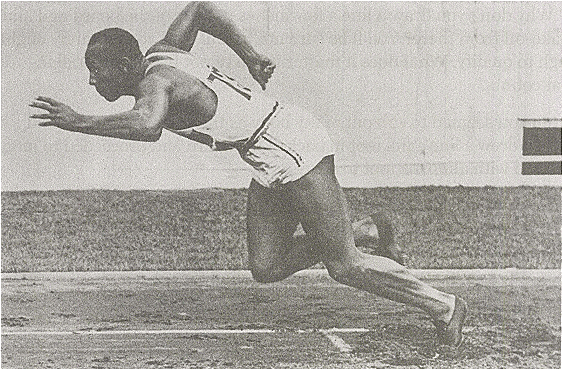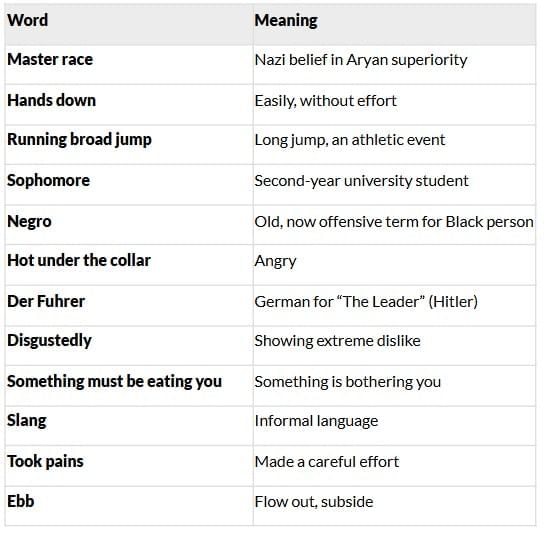My Greatest Olympic Prize Chapter Notes | Gul Mohar Class 8: Book Solutions, Summaries & Worksheets PDF Download
| Table of contents |

|
| About the Author |

|
| Key Points |

|
| Detailed Summary |

|
| Theme |

|
| Message |

|
| Vocabulary |

|
About the Author
Jesse Owens (1913–1980), born James Cleveland Owens, was an American track and field athlete who won four gold medals at the 1936 Berlin Olympics. Renowned for his sprints and long jump, he shattered Nazi racial propaganda by excelling in a hostile environment. My Greatest Olympic Prize recounts his friendship with German athlete Luz Long, highlighting human connection over competition.
Key Points
- Set during the 1936 Berlin Olympics under Hitler’s Nazi regime, which promoted Aryan supremacy, the story focuses on Jesse Owens, a Black athlete aiming for gold medals.
- Owens, confident in the long jump after setting a world record, is challenged by German athlete Luz Long, whom Hitler hoped would uphold Nazi ideology.
- After fouling twice in the trials, Owens is frustrated, but Long offers advice to jump from behind the board, helping him qualify.
- The two form a genuine friendship, talking for hours about track, life, and the world, despite their rivalry.
- Long pushes Owens to break the Olympic long jump record, congratulating him sincerely, defying Hitler’s racist glare.
- Owens values his 24-carat friendship with Long over his medals, embodying the Olympic ideal of striving well over winning.
Detailed Summary
In My Greatest Olympic Prize, Jesse Owens narrates a transformative experience at the 1936 Berlin Olympics, held under the shadow of Adolf Hitler’s Nazi regime, which championed Aryan supremacy and dehumanized Jews and Black people. Owens, a Black American athlete who trained six years for the Games, aimed to win gold medals, particularly in the running broad jump (long jump), where he held a world record of 26 feet 8-1/4 inches. 
Unfazed by Hitler’s claims of a “master race,” Owens was confident he’d win “hands down.” However, he’s surprised to see Luz Long, a German jumper, nearly matching his record in practice, a talent kept secret by the Nazis to bolster their ideology. Angered by Hitler’s racist policies, Owens, feeling “hot under the collar,” is determined to prove him wrong. His anger leads to mistakes: he fouls twice in the long jump trials by overstepping the take-off board, risking disqualification. Frustrated, he kicks the dirt “disgustedly” until Long, who easily qualified, approaches with a friendly handshake. Long, sensing Owens’ distress, uses American slang—“something must be eating you”—and suggests drawing a line a foot behind the board to avoid fouling. Calmed by Long’s reassurance and rejection of Nazi ideology, Owens follows the advice, qualifying with ease. That night, Owens visits Long’s room in the Olympic village, where they talk for two hours about track, life, and the world, forming a deep friendship. Despite being schooled in the Nazi youth movement, Long rejects Aryan supremacy, and their bond transcends competition. The next day, Long breaks his own record, pushing Owens to a peak performance, setting an Olympic record of 26 feet 5-5/16 inches. Long congratulates Owens genuinely, shaking his hand under Hitler’s glare, defying Nazi racism. Owens values this 24-carat friendship above his medals, reflecting the Olympic founder Pierre de Coubertin’s ideal: “The essential thing in life is not conquering but fighting well.” Owens’ four gold medals and grace earn German crowd cheers, but Hitler, refusing to shake hands with a Black athlete, is rebuked by the International Olympic Committee, undermining his propaganda.
Theme
The story explores friendship, racial equality, and the human spirit in overcoming prejudice. It contrasts the Olympic ideal of unity and effort with Nazi racism, emphasizing personal connection over ideological division.
Message
The message is that true victory lies in human connection and mutual respect, not just competition. Owens shows that courage, empathy, and sportsmanship can challenge hatred and foster hope, transcending barriers of race and politics.
Vocabulary

|
32 videos|62 docs|17 tests
|
FAQs on My Greatest Olympic Prize Chapter Notes - Gul Mohar Class 8: Book Solutions, Summaries & Worksheets
| 1. What is the significance of the title "My Greatest Olympic Prize"? |  |
| 2. Who is the author of "My Greatest Olympic Prize," and what is their background? |  |
| 3. What are the main themes explored in "My Greatest Olympic Prize"? |  |
| 4. How did Jesse Owens' experiences at the Olympics reflect the social issues of his time? |  |
| 5. What message does Jesse Owens convey through his story in "My Greatest Olympic Prize"? |  |




















